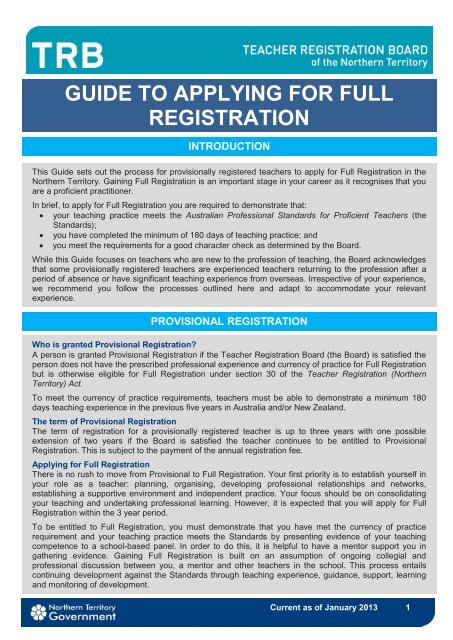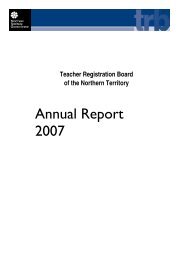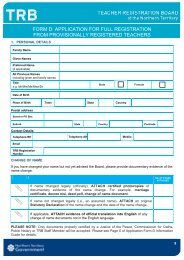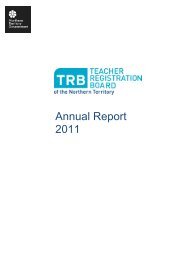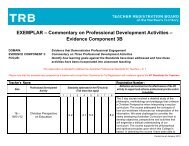GUIDE TO APPLYING FOR FULL REGISTRATION - Teacher ...
GUIDE TO APPLYING FOR FULL REGISTRATION - Teacher ...
GUIDE TO APPLYING FOR FULL REGISTRATION - Teacher ...
Create successful ePaper yourself
Turn your PDF publications into a flip-book with our unique Google optimized e-Paper software.
(9) Receive the assessment decisionThere will be one of two outcomes:Full Registration Recommended – when the panel considers your proficiency is satisfactorilydemonstrated, each panel member signs the Recommendation Report. The Principal, on the advice of theschool-based panel, endorses your proficiency by completing Form D, Section 3: Proficiency to Teach andreturns this to you with your evidence. The Principal is able to provide a comment affirming yourproficiency.ORRecommendation for a further period of Provisional Registration – if the Principal decides more focusedwork is required. You will receive written feedback indicating areas for improvement and the need toestablish an action plan for working towards meeting the Standards.If you have not met the requirements for Full Registration within the 3 year term of ProvisionalRegistration, you will be required to make an application to the Board requesting an extension of yourProvisional Registration.(10) Forward application to the <strong>Teacher</strong> Registration BoardWhen Full Registration is recommended by the panel and your proficiency endorsed by the Principal andthe Recommendation Report has been signed, forward it to the TRB.All forms can be downloaded from the TRB Website (www.trb.nt.gov.au). Applications cannot beprocessed if the application form is incomplete.(11) Retain documentationYou must keep all evidence and other relevant documentation for at least twelve months from the date ofyour assessment. This evidence may continue to be built on for registration renewal(12) Application is considered by the <strong>Teacher</strong> Registration BoardThe Board will resolve to grant Full Registration after assessing your application. If the Board is satisfiedthat you meet the requirements for Full Registration, you will be granted Full Registration.(13) Full Registration grantedYou receive formal notification of registration from the <strong>Teacher</strong> Registration Board once all registrationrequirements have been met. Your entry on the Register of <strong>Teacher</strong>s reflects your change of status andyou will receive your Registration Certificate indicating this.(14) Full Registration not grantedIf your Principal does not recommend Full Registration, you will be advised, by the Board, of the reviewprocess.** Once you are fully registered you will be required to renew your category of registration every five years.In doing so, fully registered teachers will be required to demonstrate that they continue to be proficientpractitioners with currency of practice and that they are of good character. Registration renewal is not thesame as paying the annual registration fee.DEMONSTRATING CURRENCY OF PRACTICE AND PROFESSIONALEXPERIENCECurrency of PracticeIn order to be entitled to Full Registration you must complete a minimum 180 days teaching practice. This does not have to be completed inone school or within one year. It must be equivalent to 180 days which may include a number ofindividual days as well as continuous teaching experience. You must provide evidence validating 180 days teaching practice, that is a statement of service. Astatement of service can be obtained from your employer.Current as of January 2013 3
If you were granted Provisional Registration under the Mutual Recognition Act 1997, your teachingexperience in another jurisdiction may be included as evidence of your currency of practice. Likewise, ifyou were provisionally accredited by the New South Wales Institute of <strong>Teacher</strong>s, you may submitevidence of teaching practice in New South Wales.Evidence that demonstrates professional knowledge, professional engagement and professionalpracticeYou are required to provide specific evidence against the Standards. It is highly recommended that youharvest evidence from your daily teaching or other professional activities. For this to take placesuccessfully, the following should be kept in mind: you work collaboratively with a fully registered mentor you take supported, professional responsibility for selecting evidence of meeting the Standardsduring the Provisional Registration period you identify the relationship between evidence items and the StandardsThe Board recognises sector run programs such as Probation and Performance Development andImprovement as being appropriate opportunities for you to harvest evidence and use in your applicationfor Full Registration.EVIDENCE COMPONENTSEVIDENCE THAT DEMONSTRATES PROFESSIONAL KNOWLEDGEEvidence Component 1: Examples of TeachingTwo reports on observed teaching by a mentor/experienced teacher/principal or their delegate** Observation 1: Teaching Practice and Classroom ManagementThe first observation should focus on recording aspects of teaching practice, such as classroom andstudent management, as well as communication and interpersonal relationships. Reference against theStandards and the supplementary focus questions in the templates guide this observation. The mentor isencouraged to use the Standards to provide feedback in order to affirm your strengths and identify areasfor development.** Observation 2: Areas For DevelopmentThe second observation builds on a self-audit of teaching practice, using the Standards and following onfrom the observation of teaching practice and classroom management.Reflecting on your own classroom practice, you should be able to identify an area or areas where you arerequired to develop or refine your practice. For example, you may want to explore:time managementactivities for effective learningthe management of groupsthe establishment of procedures at the beginning of a lessontechniques for managing unmotivated studentstechniques for managing disruptive studentsquestioning techniquesinterpersonal communicationcritical thinking strategiesdifferentiated learningTo assist you in learning from the identified areas of development, consideration should be given toparticipating in another teacher’s lesson and to reflect on how they manage activities or situations or thesame group of students.Current as of January 2013 4
It is also important to demonstrate the use of use negotiation and conflict resolution skills, includingcommitment to problem solving, acting with dignity and courtesy in all professional situations, beingempathetic, responding to pressure appropriately and taking responsibility for your own professionalbehaviour and the integrity of the profession.Support materials:Template – Participation in Collegial Activities – Evidence Component 2EVIDENCE THAT DEMONSTRATES PROFESSIONAL PRACTICEEvidence Component 3: Examples of Reflective Practice and Professional RenewalKeep a log of professional development activities and include reflection of how these activitieshave contributed to the enhancement of skillsBy accepting responsibility for improving your own professional practice and knowledge and undertakingappropriate professional learning to expand your knowledge and skills, you continue to grow as aprofessional.It is important for you to identify specific learning goals in order to improve your practice. In doing this youneed to consider the relationship between the professional development activity and your own teaching.Your commentaries should identify how the professional learning activity was incorporated into yourteaching and the impact that it had on the teaching, learning and assessing cycle.Your record of professional learning should demonstrate: commitment to ongoing professional learning evidence of reviewing your learning to improve your teaching and to inform future professional learningplans a systemic approach to your learning purposeful and targeted professional learning professional learning linked to the Standards the impact professional learning has had on your teaching and student outcomesCommentary on three professional development activities that identify how learning goals againstthe Standards have been addressed and how these activities have been incorporated intoclassroom teaching. These three commentaries should be supported by your guided reflection onprofessional practice against the Standards, endorsed by a fully registered teacher/mentorYour reflections should show evidence of your ability to transfer knowledge and skills to your teachingpractice and an awareness of the need to continually develop and expand professional knowledge tofacilitate maintaining current practice. To assist you in identifying the areas where you require furtherdevelopment of your skills and knowledge, a self-audit of your teaching practice against the Standards canbe helpful in affirming your strengths, as well as helping you to identify areas for improvement and ongoingprofessional learning. A professional learning plan, preferably developed with your mentor, will addressindividual goals and school and system requirements.Support materials:Template – Professional Development Activities Log – Evidence Component 3ATemplate – Commentary on Professional Learning Arising from Professional Activities – Evidence Component 3BGuide to the Commentary on Professional Development Activities** The Professional Learning System (PLS) provides teachers, principals and course providers with anintegrated online system to manage the development, delivery and certification of professional learning forDECS staff in Schools and corporate offices. This system can be accessed by anyone who has an ntschoolslog in. All teachers have an ntschools log in irrespective of who their employer is.Current as of January 2013 6
ProfessionalKnowledgeProfessionalPracticeProfessionalEngagementMAPPING THE EVIDENCE COMPONENTS AGAINST THE AUSTRALIANPROFESSIONAL STANDARDS <strong>FOR</strong> PROFICIENT TEACHERSEvidence RequirementStandards against which evidence isaligned and assessedAustralian Professional Standards forProficient <strong>Teacher</strong>s1 2 3 4 5 6 71 Two reports on observed teaching by amentor, fully registered teacher, principalor their nominee Observation 1 Observation 2An example ofplanning/teaching/learning/assessing/…reporting cycle and annotated analysislinked to the Standards2A verified record of collegial engagementwhere the provisionally registered teacherhas participated in a collaborativeplanning activity3A list of professional developmentactivities with a brief commentary onactivities that identify how learninggoals against the Standards havebeen addressed and how theseactivities have been incorporated intoclassroom practiceThree examples of commentary onthe professional learning arising fromthe professional activities anddevelopment of personal practiceagainst the Standards, endorsed by afully registered teacherCurrent as of January 2013 7t as of January 2013 5
PROFESSIONAL LEARNINGYou are required to undertake a range of formal and informal professional learning activities. Broadly, thefollowing are recognised as suitable professional development and learning experiences but should notbe seen as exclusive of other such activities: Programs, courses and conferences attended off-site and/or online Programs, courses and conferences attended in the school setting Professional Teaching Association activities Tertiary study related to a specific teaching field Structured networking with teachers from other schools School visits and exchanges Faculty or staff meetings involving discussion of approaches to teaching and learning Professional reading Being mentored by another teacherIt is recommended that you record all professional learning undertaken and have it verified by your mentor.Professional development logs can be found on the Provisional Registration pagewww.trb.nt.gov.au/registration/provisionallyregisteredteachersMAINTAINING YOUR EVIDENCEFrom the outset, it is imperative that you establish processes to collect, store, validate and maintain yourevidence against the Standards. Evidence includes, but is not limited to, items such as: Planning documents Evaluations and explanatory notes Long and short term activities planned and Activities that are related to clearly identifiedstructured to provide meaningful learninggoals Resources appropriate for the level ofdevelopment of students and designed toengage studentsVideo/audio tapes (refer to any policies relatedto using such material)Examples of a range of assessment strategies,both formal and informalAnnotated examples of yours and yourstudents’ work Case studies Reports Records of professional development Record of professional learning and reflections Observations of teaching practice Evidence of feedback (to students and you asthe teacher)Appropriate correspondence, such as an e-mailor letter from parentsMaintaining a holistic view of the Standards when identifying, collecting, annotating and referencingevidence allows for a greater understanding of your practice to be demonstrated and assessed. One pieceof evidence, such as documentation relating to a unit of work, can demonstrate proficiency across anumber of Domains and Standards. Evidence should be kept for twelve months after attaining FullRegistration as part of the audit process and can be built upon for registration renewal.Current as of January 2013 8t as of January 2013 5
THE CULMINATING JUDGEMENT AND PRINCIPAL ENDORSEMENTThere are seven steps in the recommendation process:(1) You take responsibility for maintaining a record of evidence.(2) You provide your selection of evidence of meeting the Standards to the school Principal, accompaniedby a declaration that the evidence is your own work, unless otherwise appropriately acknowledged.This evidence will include items provided or verified by fully registered teachers.(3) The Principal will establish a panel to assess your evidence against the Standards. The panel willcomprise a Senior <strong>Teacher</strong>, who will act as chair, a fully registered teacher nominated by you (thiscould be your mentor) and a fully registered teacher familiar with your work. The panel will consider theevidence you have presented and engage in collegial, professional discussion about how you havemet the Standards. Normally, in cases where there are insufficient panel members, the Principal mayseek the involvement of fully registered teachers from outside the school to assist in the panelassessment. The Principal will advise you if this is to be the case.(4) The Principal completes Form D, Section 3: Competence to Teach, in order to endorse therecommendation to the <strong>Teacher</strong> Registration Board on the advice of the school-based panel. Therecommendation may be for Full Registration or a further period of Provisional Registration.(5) Principals may seek advice from the <strong>Teacher</strong> Registration Board in individual atypical cases, forexample, where there is insufficient evidence on which to make a decision.(6) The process requires you to sign the Recommendation Report to acknowledge that you have sighted itand had the opportunity to discuss the report with your Principal and mentor. This is to be done onForm D: Section 5: Statutory Declaration. It is your responsibility to lodge with the <strong>Teacher</strong> RegistrationBoard your application for Full Registration that includes the Recommendation Report.(7) The <strong>Teacher</strong> Registration Board advises you about the outcome of the registration decision, including,where applicable, the process for review of a decision.PARTICIPANT ROLESAs your period of Provisional Registration is centred on continuing professional dialogue andengagement, clearly defined roles and responsibilities ensure that each participant is aware of whatneeds to be carried out.The Provisionally Registered <strong>Teacher</strong>As a provisionally registered teacher, you take responsibility for:(a) informing your Principal of your status as a provisionally registered teacher(b) becoming familiar with the Australian Professional Standards for Proficient <strong>Teacher</strong>s(c) engaging in ongoing reflection, identifying learning goals and professional development and learningagainst the Standards during the Provisional Registration period(d) participating in all aspects of the employer and school’s orientation programs where available(e) selecting the necessary examples of practice to demonstrate development against the Standards(f) providing a statement of service(g) presenting examples of practice to your Principal for assessment against the Standards and(h) completing and signing Form D, Section 5: Statutory DeclarationThe PrincipalThe Principal assumes responsibility for ensuring provisionally registered teachers receive access to thesupport, advice and guidance needed to apply for Full Registration. The Principal’s role is:a) to identify provisionally registered teachers in their school and initiate the necessary processesb) ensure each provisionally registered teacher has an appropriate mentor appointedc) delegate, if necessary and where relevant, responsibility to a Senior <strong>Teacher</strong>Current as of January 2013 9t as of January 2013 5
d) to complete Form D, Section 3: Proficiency to Teach in order to endorse the school-based panel’srecommendation to the <strong>Teacher</strong> Registration Board; ande) to assist the Board, if necessary, with any anomalies relating to the processThe MentorThe mentor plays an important role in supporting you in your application for Full Registration. The mentorassists you in all aspects of your Provisional Registration. In some instances, you may have more thanone mentor. The mentor’s role is:a) to become familiar with the process of moving from Provisional to Full Registrationb) to support the provisionally registered teacher in:i) developing familiarity with the requirements of the Standardsii)identifying professional learning goals as they relate to improving teacher practice and theprocess of applying for Full Registrationiii) focused discussion with regard to practice as a provisionally registered teacherc) to conduct classroom and collegial observations and engage in reflection and evaluation of thoseobservationsd) to listen, ask questions, challenge teacher practice and share critical professional knowledge viaformal and informal methods such as providing written feedback and reflectione) to support the provisionally registered teacher in planning to gather evidence for the portfolio andthen to review that evidence with the provisionally registered teacherf) to participate in the school-based panel to assess the provisionally registered teacher’s evidenceagainst the Standards and to sign-off on the panel recommendation for Full RegistrationThe <strong>Teacher</strong> Registration Board of the Northern TerritoryThe Board provides all participants where necessary, and as required, with advice and support to assistthem to attain Full Registration. The Board recognises the attainment of Full Registration as a significantachievement and important milestone in your career. It works collaboratively with all employers andschools to develop information packages and support mechanisms to assist in your application for FullRegistration.The Board:a) makes the final decision to grant or not to grant Full Registration; andb) conducts a review if a provisionally registered teacher disputes a recommendation by the schoolbasedpanel.THE RECOMMENDATION PROCESSNormally, the evaluation of evidence and the recommendation process is undertaken by a school-basedpanel of three fully registered teachers that comprises: A Senior <strong>Teacher</strong> who will act as panel chair The provisionally registered teacher’s mentor (or another teacher nominated by you) A fully registered teacher familiar with the work of the provisionally registered teacherThe recommendation meeting should take about 30 to 45 minutes. Panel members will have had prioraccess to your documented evidence of professional practice.The panel discussion provides an opportunity for collegial discussion of professional practice generallyand for you to demonstrate your professional growth against the Standards.Current as of January 2013 10t as of January 2013 5
SUPPORT <strong>FOR</strong> PROVISIONALLY REGISTERED TEACHERSThe <strong>Teacher</strong> Registration Board encourages participation in effective orientation programs and that youparticipate in a planned program of professional development and learning referenced against theAustralian Professional Standards for Proficient <strong>Teacher</strong>s with the support of one or more fully registeredteachers.The <strong>Teacher</strong> Registration Board recommends the following as suitable support for you as a provisionallyregistered teacher: Formal orientation programs delivered by employers; School-based orientation programs; Employer probation programs, and; Mentoring and coaching programs.Elements of effective orientation programs are identified in the work of employing authorities and include:information and support; guided reflection; clear goals for development; action plans for areas ofdevelopment in terms of elements of the Standards; observation of teaching; opportunities to observeanother teacher; professional discussions with colleagues; participation in appropriate professionaldevelopment and collegial activities and formative assessment and feedback.SUPPORT DOCUMENTATIONAvailable on the TRB-NT Website are a range of support tools that may assist you to reflect on yourpractice; they are not mandatory and are suggestions only. It is not anticipated that you will use everytool. You may choose to utilise the tools in their current form or adapt them to suit your own setting.Alternatively, your school or system may have established its own approaches and methods fordocumentation. In all cases you should be guided by your mentor and/or the appropriate Senior <strong>Teacher</strong>.WHERE <strong>TO</strong> GET HELPThe <strong>Teacher</strong> Registration Board aims to provide a supported process for eligible teachers who wish toapply for Full Registration.The Information Sessions offered by the Board will assist you in establishing professional networks withother provisionally registered teachers. The Board will provide you with detailed information to help youget started on your application.The Information Sessions will allow you:• to clarify the requirements and the process• to confirm that you are ready to begin the process of applying for Full Registration• to interpret the Australian Professional Standards for Proficient <strong>Teacher</strong>s• to identify appropriate evidence and plan for gathering evidence• to map and present your evidenceRemember that a mentor is best placed to provide support in gathering and presenting evidence and, inmost instances, can be called on to provide advice and feedback during the process.Current as of January 2013 11t as of January 2013 5
CONTACT THE BOARD<strong>Teacher</strong> Registration Board of the Northern TerritoryLevel 2, Harbour View Plaza8 McMinn Street(Cnr McMinn Street and Tiger Brennan Drive)Darwin NT 0801Toll free: 1800 110 302Office: 08 8944 9388Fax: 08 8999 4195Email trb@nt.gov.auCurrent as of January 2013 12t as of January 2013 5


